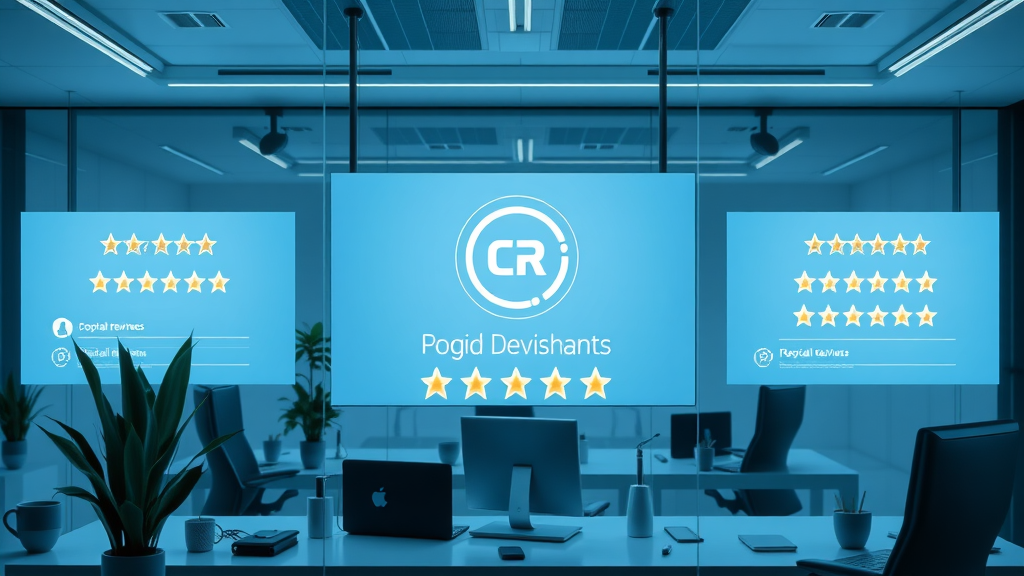Did you know? “A one-star increase in online ratings can lead to a 5-9% increase in revenue.” — Harvard Business School Study. In today’s hyper-connected world, corporate reputation marketing isn’t just an afterthought—it’s a powerful lever to unlock growth, build unshakable trust, and outperform competitors. As search engines, review sites, and social media platforms amplify every customer’s voice, your company’s reputation becomes your biggest business asset. Dive in to find out how strategic reputation marketing can propel your business to exceptional heights.
What You’ll Learn in This Guide
- How corporate reputation marketing drives business growth
- Core elements and unique value of reputation marketing
- Strategies to integrate online reviews and social media
- How to design a winning reputation marketing strategy
- Key metrics and examples of real-world transformation
- The future of online reputation management tools
Why Corporate Reputation Marketing Drives Exceptional Business Growth
Corporate reputation marketing plays a pivotal role in shaping perception and igniting growth. In the digital age, potential customers often interact with your brand content long before direct contact, and their trust is heavily influenced by positive reviews and what search engines reveal. A positive reputation opens doors to new opportunities, attracts top talent, and creates a loyal customer base. According to recent industry insights, organizations actively managing their reputation report stronger sales, higher customer retention, and improved business resilience.
More than ever, online presence and the strength of your reputation management efforts determine business success. Prospective buyers and clients increasingly rely on review sites, media platforms, and social proof to assess credibility. This elevates the importance of amplifying positive feedback and strategically managing negative reviews. Companies investing in reputation marketing enjoy not only robust growth but also a buffer against competitive threats and market shifts—highlighting the exceptional ROI of this approach.
Industry Insights: The Powerful Influence of Corporate Reputation Marketing
Research consistently confirms the outsize impact of reputation marketing on modern business trajectories. Statistics reveal that over 80% of consumers trust online reviews as much as personal recommendations, making your online reputation a silent salesperson, working around the clock. Studies show that improving brand content and accumulating positive reviews increase customer loyalty, attract high-value partners, and facilitate premium pricing. For example, a business with a sterling reputation can bounce back faster from setbacks due to entrenched public support and goodwill.
Moreover, social media has broadened the reach and speed of reputation formation. Viral testimonials—whether favorable or critical—can dramatically shift customer perception in hours. Forward-thinking companies track these shifts, using real-time analytics and feedback to guide marketing efforts and swiftly address negative feedback. The ability to consistently nurture a positive brand reputation increasingly differentiates market leaders from laggards.

“A one-star increase in online ratings can lead to a 5-9% increase in revenue.” — Harvard Business School Study
Defining Corporate Reputation Marketing and Its Business Value
Corporate reputation marketing encompasses the proactive strategies and tactics used to promote, monitor, and enhance a company’s standing in the eyes of stakeholders. Unlike traditional advertising, it relies on building trust and credibility—leveraging customer experiences, online reviews, and brand content to establish a positive and enduring identity. The tangible business value lies in increased sales, greater influence, and sustainable growth—even in uncertain markets.
As information flows faster than ever, a company’s digital footprint forms the bedrock of its reputation. This means actively managing perceptions through a combination of authentic storytelling, positive feedback amplification, and vigilant reputation management . The return on investment for reputation marketing is clear: strengthened brand equity, resilient customer relationships, and enhanced market share. Businesses that prioritize this today lay a foundation for long-term expansion.
The Core Elements of Reputation Marketing
Reputation marketing is built on three main pillars: customer feedback , consistent brand content , and responsive engagement. First, soliciting and highlighting positive reviews from satisfied customers on trusted review sites establishes authenticity and fosters trust online. Second, creating and sharing meaningful content—across web pages, blogs, and social media platforms—keeps your brand top-of-mind while expressing unique values and strengths. Third, prompt responses to customer inquiries and reviews, whether positive or negative, demonstrate commitment to customer experience and brand transparency.
Each of these elements compounds over time, setting leading companies apart. Reputation marketing is not a ‘set it and forget it’ activity: it’s a continual process of listening, learning, and leveraging public sentiment. By integrating reputation marketing with broader marketing strategy , organizations can stay relevant, agile, and ahead of reputational risks.

Difference Between Reputation Marketing and Reputation Management
While closely related, reputation marketing and reputation management serve distinct purposes. Reputation management is primarily reactive, focusing on identifying, addressing, and mitigating issues that could harm your company’s reputation—such as responding to negative reviews or managing crises on social media. This discipline ensures existing problems don’t escalate and further damage your online reputation.
In contrast, reputation marketing is proactive . It targets deliberate amplification of positive reputation , customer experiences, and achievements. This involves promoting favorable stories, accumulating glowing online reviews, and fostering ongoing dialogue through personalized brand content . Both approaches are essential, but reputation marketing lays the groundwork for lasting growth and shields the brand from future threats.
Why a Positive Reputation Fuels Brand Trust and Growth
A positive reputation is the bedrock of business expansion in a noisy, competitive marketplace. When people see consistent positive feedback —across review sites, social media, and your digital platforms—they’re more likely to become customers and advocates. Word-of-mouth, once local and limited, now spreads globally in seconds. Businesses that harness reputation marketing don’t just drive sales—they create trust online, foster loyal communities, and become the go-to solution in their industry.
Trust built from strong reputation marketing efforts doesn’t just lead to “one-off” sales. It supports long-term value creation, repeat purchasing, and organic business growth through recommendations and referrals. Ultimately, a positive reputation acts as a durable competitive advantage, allowing your company to weather challenges and capitalize on new opportunities swiftly.
How Reputation Marketing Intersects with Online Reviews and Social Media
Your brand’s public perception is shaped more by voices outside your organization than within. That’s why online reviews and social media activity are central to modern corporate reputation marketing. Negative feedback can quickly ripple out, but positive reviews and robust engagement can lift your company’s image, expand reach, and drive marketing efforts forward exponentially. Integrating these digital touchpoints into your marketing strategy is no longer optional—it’s mission critical.
Leveraging Online Reviews to Amplify Corporate Reputation Marketing
Online review sites like Google, Yelp, Trustpilot, and Glassdoor can make or break your reputation marketing initiatives. Customers researching your brand rely heavily on peer opinions and star ratings. Generating a steady stream of positive reviews is key to building trust online, boosting social proof, and enhancing your online presence. Each new star rating not only supports direct sales but also helps search engines prioritize your business in ranking algorithms, further fueling growth.
Proactively gathering and showcasing testimonials, responding to every review—positive or negative—and learning from feedback ensures credibility. Engaged companies often see a compounding effect, where satisfied customers become active promoters on multiple platforms, amplifying positive sentiment and defending your brand integrity. It’s an ongoing cycle that requires intentional nurturing through your reputation marketing strategy.

- Politely request reviews at natural touchpoints (post-purchase or after resolving an issue)
- Make it easy with direct links to review sites
- Offer non-monetary incentives, such as recognition, for honest feedback
- Personalize requests with names and context
- Consistently monitor and thank reviewers to encourage ongoing engagement
Role of Social Media in Boosting Corporate Reputation
Social media platforms, from LinkedIn and Twitter to Instagram and Facebook, act as public arenas for brand storytelling, real-time engagement, and crisis management. Active, transparent participation builds rapport, humanizes your brand, and multiplies touchpoints for positive feedback . Strategic content sharing, prompt customer service, and showcasing testimonials on these channels amplify your reputation marketing investments and widen your audience.
Additionally, social media platforms enable you to track sentiment in real-time and identify opportunities for authentic dialogue. By sharing behind-the-scenes glimpses, responding to both praise and negative reviews, and collaborating with influencers, brands can reinforce positive brand perception and recover quickly from negative publicity. Consistency and authenticity are essential ingredients for channeling social media’s power into sustainable reputation growth.

- LinkedIn: For B2B thought leadership and professional brand content
- Facebook: Broad audience engagement and customer service dialogue
- Instagram: Visual storytelling and showcasing company culture
- Twitter: Real-time updates, crisis communications, and industry conversations
- Glassdoor: Managing employer brand reputation and employee feedback
Managing Negative Feedback to Protect Online Reputation
No company is immune to criticism, but how you handle negative feedback can define your brand for years. Promptly acknowledging and addressing concerns shows accountability and empathy. It’s crucial to respond publicly on review sites and social media platforms where customers have voiced issues, offering concrete solutions or pathways for further discussion. A thoughtful response not only satisfies the original reviewer but also demonstrates to potential customers your brand’s commitment to exceptional customer service .
Remember, turning negative reviews into opportunities for exceptional service can win back dissatisfied customers and sway public opinion in your favor. When negative feedback is managed transparently, it can even become a catalyst for positive reputation improvement, showcasing your willingness to evolve and prioritize customer experience .
“Your brand is what other people say about you when you’re not in the room.” — Jeff Bezos
Strategic Approach to Online Presence in Corporate Reputation Marketing
Optimizing your online presence is about more than having a slick website; it involves presenting consistent, high-quality brand content across all digital touchpoints. Aligning SEO, customer reviews, and social media messaging ensures that search engines and potential customers both view your business as trustworthy and authoritative. Regularly refining your digital footprint enables you to control your narrative, improve search engine rankings, and maximize every marketing opportunity.
Optimizing Online Presence for Enhanced Brand Content
To stand out in the digital marketplace, focus on delivering fresh, relevant, and authentic brand content . Blog articles, customer case studies, and educational resources published across your platforms keep your company top-of-mind and boost organic search visibility. Incorporating SEO best practices and integrating customer reviews within site content encourages longer engagement and cement your reputation as an industry leader.
Engage potential customers through rich media—images, videos, infographics—and highlight company achievements, community involvement, and positive testimonials. By ensuring every digital interaction is purposeful, accessible, and value-driven, you establish a strong foundation for scalable reputation marketing results.

Integrating Marketing Software for Seamless Reputation Management
Modern marketing software platforms streamline reputation management by automating review requests, monitoring brand mentions, and aggregating feedback across channels. Unified dashboards let you analyze sentiment, track trends, and identify emerging issues before they escalate. Integration with CRM systems empowers customer support teams to respond swiftly and consistently.
Leading organizations use reputation marketing software not just for reactive management but also as tools for amplifying success stories and identifying advocates within their customer base. These platforms allow companies to scale reputation programs efficiently, measuring the impact of each campaign and optimizing their approach using real data.
Developing a Corporate Reputation Marketing Strategy
Every effective corporate reputation marketing strategy starts with clear objectives: whom do you aim to influence, what outcomes define success, and how will your progress be measured? By aligning your approach with business goals and stakeholder values, you lay the groundwork for a sustainable program that supports revenue growth, brand integrity, and employee engagement.
Successful strategies integrate the collection and showcasing of customer feedback , continuous improvement based on insights, and the use of reputation marketing software for efficient execution. Regular audits and transparent communication ensure teams stay aligned and agile as expectations and digital landscapes evolve.
Building a Results-Oriented Reputation Marketing Strategy
To craft a results-driven strategy, start by assessing your current online reputation—across review sites, social media, and search engine listings. Define your unique brand voice and determine the best channels for amplifying your positive brand story. Incorporate feedback loops to ensure ongoing improvement and rapid response to emerging trends or crises.
Utilize data to set performance benchmarks, then tailor engagement tactics based on where your customers are most active—whether that’s Google reviews, Instagram, or LinkedIn. Combine proactive review generation with targeted content campaigns to reinforce credibility at every digital touchpoint.
- Audit existing online reputation and identify strengths/weaknesses
- Set measurable goals for review volume, rating improvements, and engagement
- Choose the right review platforms and social channels for your industry
- Develop content and response guidelines for customer interactions
- Continuously monitor, report, and iterate on your reputation marketing efforts
Aligning Customer Experience with Corporate Reputation Marketing
There’s a direct link between exceptional customer experience and a strong reputation. Every interaction—from initial outreach to post-purchase support—shapes how customers, employees, and the wider market perceive your brand. Aligning teams around the importance of transparent communication and responsive service ensures every customer touchpoint leaves a positive impression.
Empowering front-line staff with training, resources, and clear guidelines fosters an environment where delivering value becomes second nature. Seamless feedback collection, swift conflict resolution, and personalized thank-yous all elevate the perceived integrity of your brand and support sustained reputation growth.
- Train employees to consistently deliver exceptional service and exceed expectations
- Implement streamlined processes for collecting, learning from, and responding to feedback
- Recognize and reward team members who embody brand values and delight customers
- Address issues transparently, offering clear resolutions and following up post-resolution
- Analyze feedback trends to inform operational and product improvements
Utilizing Reputation Marketing Software for Automated Success
Reputation marketing software takes the guesswork out of online reputation management, making it easier to centralize, monitor, and respond to all digital touchpoints. Top platforms automate review requests, aggregate feedback from multiple sites, and provide actionable insights for continuous reputation optimization.
With real-time analytics dashboards and AI-powered sentiment analysis, businesses can spot emerging trends, strengthen positive sentiment, and intervene quickly when issues arise. Automation ensures rapid, consistent responses, freeing up teams to focus on strategic growth initiatives rather than manual review monitoring.
| Platform | Features | Best For | Pricing |
|---|---|---|---|
| Birdeye | Review aggregation, analytics, auto-responses, survey integration | Large enterprises & multi-location brands | $$$ (Tiered) |
| Podium | Text-based reviews, messaging, integrations, reporting | Local businesses & service providers | $$ (Flexible) |
| Reputation.com | Comprehensive monitoring, listings management, advanced analytics | Regulated industries & franchises | $$$ (Custom) |
| Trustpilot | Public reviews, widgets, API access, marketing tools | E-commerce & SaaS companies | $$ (Freemium) |
Measuring the Effectiveness of Corporate Reputation Marketing
To justify investments and further optimize your strategy, it’s vital to track key reputation marketing metrics. These indicators offer a window into how your brand is perceived, what’s working, and where improvements can be made. Metrics also help demonstrate ROI to leadership and justify scaling marketing efforts for greater growth.
Metrics to Track in Reputation Marketing Efforts
The most valuable metrics for reputation marketing include: average star rating across major review platforms, volume of new reviews over time, sentiment analysis (positive vs. negative mentions), share of voice on social media , and net promoter score (NPS). Additional indicators like engagement rates on brand content and search engine visibility help round out your understanding of online presence.
Tracking these KPIs allows you to benchmark performance, identify emerging challenges, and celebrate wins. Regular reporting also empowers teams to adjust tactics and double down on campaigns generating the most positive feedback and long-term results.

How Search Engine Visibility Correlates with Corporate Reputation
A company’s search engine ranking is closely linked to its corporate reputation marketing strength. Websites with abundant positive reviews, consistent customer engagement , and robust content earn higher placement, drawing in more organic traffic. Search engines prioritize trustworthy brands by analyzing sentiment in online reviews and signals from authoritative media platforms.
This synergy means that investing in reputation marketing leads to compounding growth—improving SEO while solidifying your status as a trusted industry leader. Companies with strong, visible reputations are not only easier to discover but also convert visitors to customers at higher rates.
| Metric | Description | Why It Matters |
|---|---|---|
| Average Review Rating | The mean score across all review platforms | Directly impacts trust and purchase intent |
| Review Quantity | Total number of new reviews in set period | Indicates brand momentum and engagement |
| Sentiment Ratio | Proportion of positive to negative feedback | Reveals public mood and brand trajectory |
| Organic Search Traffic | Visitors from non-paid search engine listings | Measures visibility and credibility |
| Social Media Engagement | Likes, shares, comments across platforms | Shows brand relevance and word-of-mouth |
Case Studies: Positive Reputation Leading to Business Transformation
Consider the story of a regional healthcare provider that implemented a structured reputation marketing program: By proactively requesting feedback from patients, swiftly addressing negative reviews, and showcasing positive testimonials across social media, they increased new appointments by 25% in 12 months. Employee morale also improved, as staff took pride in public recognition for excellent service.
Likewise, a B2B software company used reputation marketing software to monitor, collect, and promote reviews on key industry platforms. Transparent communication during product upgrades turned previous critics into vocal advocates, and positive sentiment on review sites directly contributed to winning larger enterprise contracts. These examples underscore how a powerful, positive reputation can spark transformative, measurable results.

Future Trends in Corporate Reputation Marketing and Online Reputation Management
The reputation marketing landscape is rapidly evolving, shaped by new technologies, shifting consumer expectations, and intensified competition. Companies that anticipate future trends and invest in next-generation solutions will enjoy a long-standing advantage in building trust and driving sustainable growth.
Emerging Tools and Platforms in Reputation Marketing Software
Cutting-edge reputation marketing software now offers AI-powered sentiment analysis, real-time alerts for negative feedback, and seamless integration with chatbots and voice assistants. Future-forward platforms provide predictive analytics, consolidating data from review sites, social media, and customer service interactions into actionable insights.
Automated workflows, machine learning recommendations, and customizable dashboards are empowering companies to monitor their reputation at scale—reducing response times, minimizing risk, and uncovering fresh ways to highlight positive brand content . Keeping pace with technological advancements is essential for staying relevant and agile.

Shifts in Consumer Expectations Related to Online Reputation
Consumers increasingly expect transparency, authenticity, and rapid engagement from brands. They demand clear responses to negative feedback, prompt resolutions, and visible appreciation for positive reviews. Companies unable to meet these new standards risk falling behind, while those that successfully adapt build deeper trust online and inspire positive word-of-mouth.
The rise of micro-influencers, video testimonials, and instant messaging is transforming how consumers share and evaluate brand reputation. A proactive, customer-centric approach to reputation marketing remains the best way to meet—and exceed—these evolving expectations.
Addressing Key Questions About Corporate Reputation Marketing
What is an example of a corporate reputation?
'Apple’s reputation as an innovator continues to attract loyal customers and drive record profits.'
Apple’s reputation highlights how consistent product excellence, creative marketing, and exceptional customer experience foster widespread loyalty and trust online. Their image as an industry leader and innovator reinforces brand confidence, customer retention, and premium pricing power.
What is the meaning of reputation in marketing?
In marketing, reputation refers to the collective perception of a company, product, or service formed by customer experiences, external opinions, and public discourse. A strong reputation is a critical business asset, influencing purchase decisions, partner relationships, and the effectiveness of marketing strategies.
What are the top three factors in corporate reputation?
- Transparency and communication
- Customer experience and satisfaction
- Quality of products/services and value delivery
What is corporate brand reputation?
Corporate brand reputation is the sum of all opinions and attitudes held by customers, employees, partners, and the public about a company and its brand. It reflects values, reliability, social responsibility, and product quality, directly impacting business outcomes and long-term success.
Frequently Asked Questions About Corporate Reputation Marketing
- How does reputation marketing generate business growth? By building trust, generating positive reviews, and improving search engine visibility, reputation marketing influences purchase intent and encourages repeat business. It positions your brand as credible and attractive to both customers and partners, fueling measurable growth.
- Which industries benefit most from reputation marketing? Every industry gains from reputation marketing, but the effect is most pronounced in high-trust sectors like healthcare, legal, financial services, hospitality, and retail—where reviews and word-of-mouth often dictate buyer choices.
- How can companies recover from negative feedback online? Prompt, empathetic responses—offering solutions and following up—can turn critics into advocates. Transparency, consistency, and demonstrating genuine commitment to improvement are key to regaining trust and restoring a positive online reputation.
- What is the difference between online reputation management and reputation marketing? Online reputation management focuses on monitoring and addressing negative issues, while reputation marketing is about proactively generating and leveraging positive sentiment to enhance brand image and drive business growth.
Key Takeaways for Implementing Successful Corporate Reputation Marketing
- Corporate reputation marketing is foundational for long-term business growth
- Positive online reviews and a strong online presence are essential assets
- Leveraging feedback, marketing software, and social media maximizes impact
Unlock Powerful Growth Through Proactive Corporate Reputation Marketing
Act today by prioritizing your reputation marketing strategy—solicit honest feedback, engage actively on critical review sites and social media platforms, and leverage cutting-edge software. Proactive investments in your online reputation will unlock significant business growth and secure your brand’s legacy.
 Add Row
Add Row  Add
Add 




Write A Comment